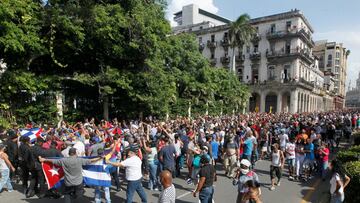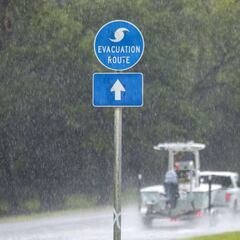What has President Biden said about the protests in Cuba?
President Biden states his public support for the Cuban protests driven by a desire for democracy. However, the US embargo has driven much of the social unrest.


Protestors, both in favor and opposition to the government, have taken to the streets across Cuba. The island nation, led for decades by Fidel Castro, who died in 2016, has struggled under a brutal embargo for more than fifty years. While the country has developed its own covid-19 vaccine, food and medical supply shortages, and a recent spike in tourism-related covid-19 cases has spurred protests.
More than a year after the pandemic began, Cubans in Havana, Santiago de Cuba, and other cities have joined protests calling for their leader, Miguel Díaz-Canel, to step down.
These protests are some of the largest since the early 1990s, which occurred after the fall of the Soviet Union.
On 12 July, the White House released a short statement on the protests, affirming that the United States stands “with the Cuban people and their clarion call for freedom and relief from the tragic grip of the pandemic and from the decades of repression and economic suffering to which they have been subjected by Cuba’s authoritarian regime.”
We stand with the Cuban people as they bravely assert their fundamental and universal rights, and as they all call for freedom and relief from the tragic grip of the pandemic and from the decades of repression and economic suffering. https://t.co/KGY3MFfsw0
— President Biden (@POTUS) July 12, 2021
The statement continued saying that the US supports the “Cuban people are bravely asserting fundamental and universal rights” and called on the regime “to hear their people and serve their needs at this vital moment rather than enriching themselves.”
US officials have always stated that the embargo and other measures taken were done to bring democracy to the island by undermining the power of its leaders. President Biden's statement mirrors this ideology, one which President Obama described as "an outdated approach that for decades has failed to advance our interests.”
It is undeniable that the US embargo has impacted Cuba's ability to care for its citizens during the pandemic. Last April, UN officials urged the Trump administration to lift trade restrictions saying that the unwillingness to do so "may lead to a higher risk of such suffering in Cuba and other countries targeted by its sanctions." Trump did not follow the advice, and in the fall, opted to add more restrictions. Biden has yet to make his position on how he plans to move relations with Cuba forward public, and these protests may force him and his administration to do so.
Many of the protestors are calling for the resignation of President Diaz-Canal, who has, in turn, blamed the massive wave of unrest on US “economic asphyxiation."
I have lived in Cuba for nine years and the scenes we saw today were stunning. The protests spread more quickly than anyone could have imagined. I don’t know what tomorrow will bring but the level of discontent and anger isn’t going anywhere. pic.twitter.com/K8LZyuBY1R
— Patrick Oppmann CNN (@CNN_Oppmann) July 12, 2021
During a television address, President Diaz-Canal mentioned that the protests stem from a growing “campaign against the Cuban revolution,” which has drawn on the “problems and shortages we are living.” While the political future of the island is unclear, the impact the embargo has had on Cuban life for more than a half-century is not.
How has the embargo impacted Cuba during the pandemic?
The statement released by the White House was short and made no mention of the impact the US’ decades-long embargo has had on the Cuban people.
The international community overwhelmingly opposes the embargo.
On 23 June, the United Nations General Assembly voted almost unanimously, calling on the United States to lift the embargo. This vote is the 29th time the resolution has been brought before the assembly. Colombia, Brazil, and Ukraine abstained, the United States and Israel voted no, and the remaining countries voted in favor of the removal of the embargo.
All people have the right to protest and to live in a democratic society. I call on the Cuban government to respect opposition rights and refrain from violence. It’s also long past time to end the unilateral U.S. embargo on Cuba, which has only hurt, not helped, the Cuban people.
— Bernie Sanders (@SenSanders) July 13, 2021
In comments made before the General Assembly, Cuban Foreign Minister Bruno Rodríguez Parrilla described the embargo as a “massive, flagrant and unacceptable violation of the human rights of the Cuban people.”
The US Political Coordinator for the US Mission, Rodney Hunter, rebuked this criticism saying, that “Sanctions are a legitimate way to achieve foreign policy, national security, and other national and international objectives.”
However, the academic research on the topic is in near agreement “that conventional trade and financial sanctions result in some meaningful behavioral change in the targeted, or sanctioned, country about 40 percent of the time.” Additionally, researchers have shown that sanctions are typically more successful when deployed against “democratic regimes and allies than autocracies and hostile countries.”
Mr. Hunter also mentioned that the United States, “significant supplier of humanitarian goods to the Cuban people and one of Cuba’s principal trading partners.” Continuing, Hunter noted that each year Congress allocates billions in aid to send “food and other agricultural commodities, medicines, medical devices, telecommunications equipment, consumer goods, and other items" to the island.
The UN General Assembly vote on the embargo was taken in 1992. Since then, the US has implemented further restrictions to the blockade, against the opinion of many of its allies.
The US tightens the embargo
To weaken Fidel Castro’s regime, Rep. Robert Torricelli proposed the Cuban Democracy Act (CDA), which became law in 1992. The act made it more challenging for Cuba to trade with other countries by making them ineligible to receive foreign assistance and debt forgiveness.
While the law did create exceptions for medical supplies and other humanitarian goods, the country still faces significant challenges in procuring essential supplies.
The Washington Office on Latin America (WOLA), an NGO focused on building better relations between Latin American Countries, has reported on the difficulties US law creates in obtaining essential supplies.
Many US government officials will argue that the US has no role in the shortages because the CDA creates exceptions for medical supplies. However, WOLA has reported that since the passage of the CDA, “no U.S. parent company has received a license” to export medicines and medical supplies to the country.
WOLA pointed to US data that show significant decreases in the shipment of humanitarian assistance before and after the passage of the CDA.
Related stories
In 1990, two years before the law was passed, Cuba imported more than $400 million worth of food and medical supplies from the US. Between 1992 and 1995, that figured decreased to $64 million. These cuts came at the beginning of the “Special Period,” an era marked in Cuban history by economic crisis and famine after the collapse of their biggest trading partner, the Soviet Union. The combination of the Soviet collapse and the tightening of the embargo led to an estimated decrease in caloric intake of around twenty-seven percent between 1990 and 1996.
Additionally, as “U.S. owned companies increasingly dominate the world market in medicines and medical equipment,” it becomes even more challenging for Cuba to obtain critical supplies. WOLA estimates that fifty percent of drugs developed between 1972 and 1992 are not available to Cuba because they were manufactured or patented in the US. This includes monoclonal antibody treatments and other therapeutics to treat covid-19.

